Class 116 DMU images identified by Set No.
« ‹ Page 37 of 81, displaying 721-740 of 1605 images › »
C395

26th September 1992
51140
51140 heads the Cardiff Valleys Farewell 116 tour at Pontycymer in the Garw Valley 26/9/92, formed of C395 (51140 + 51153) & C392 (51147 + 51134). Mac Winfield.

26th September 1992
51140
C395 (51140 + 51153) and C392 (51147 + 51134) at Onllwyn with the Monmouthshire Railway Society 'DMU Demise' railtour on 26 September 1992. Robert Thomas.
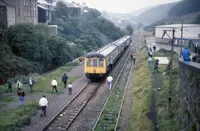
26th September 1992
51140
The Monmouthshire Railway Society DMU Demise / Cardiff Valleys Farewell tour at Pontycymer in the Garw Valley on 26 September 1992. It was formed of two two-car sets, formed of C395 (51140 + 51153) and C392 (51147 + 51134). Stuart Mackay Collection.
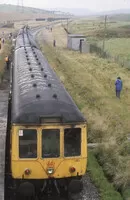
26th September 1992
51134
Class 116s C392 (51134 + 51147) and C395 (51153 + 51140) at Onllwyn with the Monmouthshire Railway Society 'DMU Demise' railtour on 26 September 1992. Stuart Mackay Collection.
C396
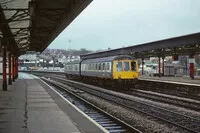
20th February 1990
51133
Hybrid DMU st C396 formed of Class 116 DMBS 51153 and Class 108 DMSL 52053 passes through Newport station on 20 February 1990. Keith Miller.
C397

28th April 1990
51136
51136 and 52059 (set C397) arrives at Llanbradach working the 09:50 Bargoed-Barry Island, 28/4/90. Gazza Prescott.
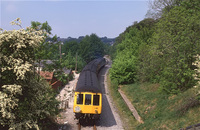
12th May 1990
51136
I did all too little photography of the South Wales branches and my only pictures on the line from Lime Kiln Junction near Newport to Oakdale Colliery are those showing The Caerwent Cannonball 2 DMU tour that ran on 12 May 1990. My notes give no indication at all of the various locations visited so the captions are necessarily vague. Two DMUs, a two car Class 118 (51315/51330) and a three car Class 116/108 hybrid (51133/59248/51136), were used and a headboard was carried on each end to make life easier for the crew during the several reversals on the other branches covered during the day. The vista on the Oakdale branch opened out a bit at a few locations and the sun did manage to appear at times thoughout the afternoon. The hawthorn blossom is prominent in this view as the train receded from the camera. Peter Tandy.
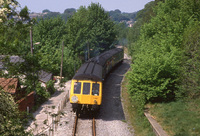
12th May 1990
51136
I did all too little photography of the South Wales branches and my only pictures on the line from Lime Kiln Junction near Newport to Oakdale Colliery are those showing The Caerwent Cannonball 2 DMU tour that ran on 12 May 1990. My notes give no indication at all of the various locations visited so the captions are necessarily vague. Two DMUs, a two car Class 118 (51315/51330) and a three car Class 116/108 hybrid (51133/59248/51136), were used and a headboard was carried on each end to make life easier for the crew during the several reversals on the other branches covered during the day. This was such a decent location that it seemed worthwhile to wait for the train to come back from Rhiw-Syr-Daffydd level crossing, the furthest point reached by the Caerwent Cannonball 2 on 12 May 1990. I just changed to an 85mm lens in order to give a slightly different viewpoint. Peter Tandy.

12th May 1990
51136
Plenty of heads watching the way ahead as the Caerwent Cannonball 2 (51136/59248/51133 + 51330/51315) runs back towards Newport on 12 May 1990. The walker on the well-used track seemed to be more bemused by the sight of photographers on the bridge more than the presence of a train on the by then unused railway line. Peter Tandy.

12th May 1990
51136
The Monmouthshire Railway Society were renowned for their South Wales DMU tours which often had an ambitious itinerary but also reached the ends of the more unusual freight lines in the area as well. The railtour seen here is the "Caerwent Cannonball II" on May 12, 1990 which was formed of set C397 which had three brake vans, Class 116 DMBS 51136, Class 108 TBS 59248 and Class 116 DMBS 51133, and class 118 set C472 (51330 + 51315). Tour participants are seen wandering round within the dock sidings at Newport South Docks. A far cry from modern tours where alighting at the ends of freight branches is strictly forbidden. Adrian Nicholls.

12th May 1990
51136
The MRS (Monmouthshire Railway Society) Caerwent Cannonball II railtour is seen at the BR limit of ownership on the Uskmouth branch on 12 May 1990. The train was formed of a 2-car class 118 and 3-car class 116/108 hybrid DMU's with 51136 seen closest here. The MRS were usually able to reach the end of such lines with their tours but in 1990 the section beyond here at the 2m 74ch point where the stop board was located still belonged to the CEGB (Central Electricity Generating Board) and was out of use. Uskmouth B Power Station was still in full production but had never been upgraded to receive Merry-go-Round coal trains. It had stopped taking coal by rail in 1984 delivered in vacuum brake wagons and switched to supply by road but the branch remained in situ mothballed hence the red rust here. Adrian Nicholls.
C902
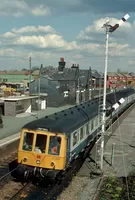
4th April 1990
C902 is a hybrid set passing Nantwich with a Cardiff train. The rear 2 cars seem to be class 108? Jonathan Watson.
C980

31st December 1988
53089
Short-lived hybrid C980 (53089 + 51513) passes Canton on 31/12/88. Mac Winfield.
CD563

1969
A Class 116 set in Barking station service to Kentish Town in 1969. Set number CD563 is in the cab window, Steve Davies Collection.

circa 1971
A Class 116 awaits departure for Barking at Kentish Town circa 1971. The set number in the cab window could be CD563. John Law.
CH298

13th August 1988
53910
Class 116 set CH298 (53910 + 53847) is seen at Hooton, Merseyside on 13/08/1988. Graeme Phillips Collection.

23rd August 1988
53910
Class 116 2-car DMU 53910+ 53847 (DMS+DMBS) running as set CH298 at Chester with the Hooton shuttle, 23-8-88. On Tour With The Class 13 Army.
L208
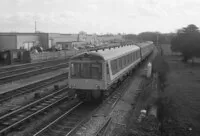
February 1989
53083
Class 116 DMBS 53083 carrying set number L208 is standing in for a Class 119 DMS at Oxford in this February 1989 view. Stuart Mackay Collection.
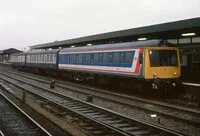
circa March 1989
53083
Looking recently painted into NSE livery is Class 116 DMBS 53083 carrying set number L208 standing in for a Class 119 DMSL. Oxford station, the slide process date was March 1989. Stuart Mackay Collection.
L210

27th March 1991
53083
Class 116/101 hybrid L210 with 53083 leading enters Reading on 27/3/91. 53083 lost it’s original working partner as long ago as 1961 when 50125 was written off by a runaway coal train in the Afan Valley, South Wales. The 101 DTC is presumably 54381. Mac Winfield.


